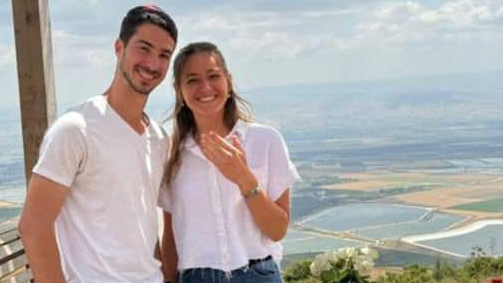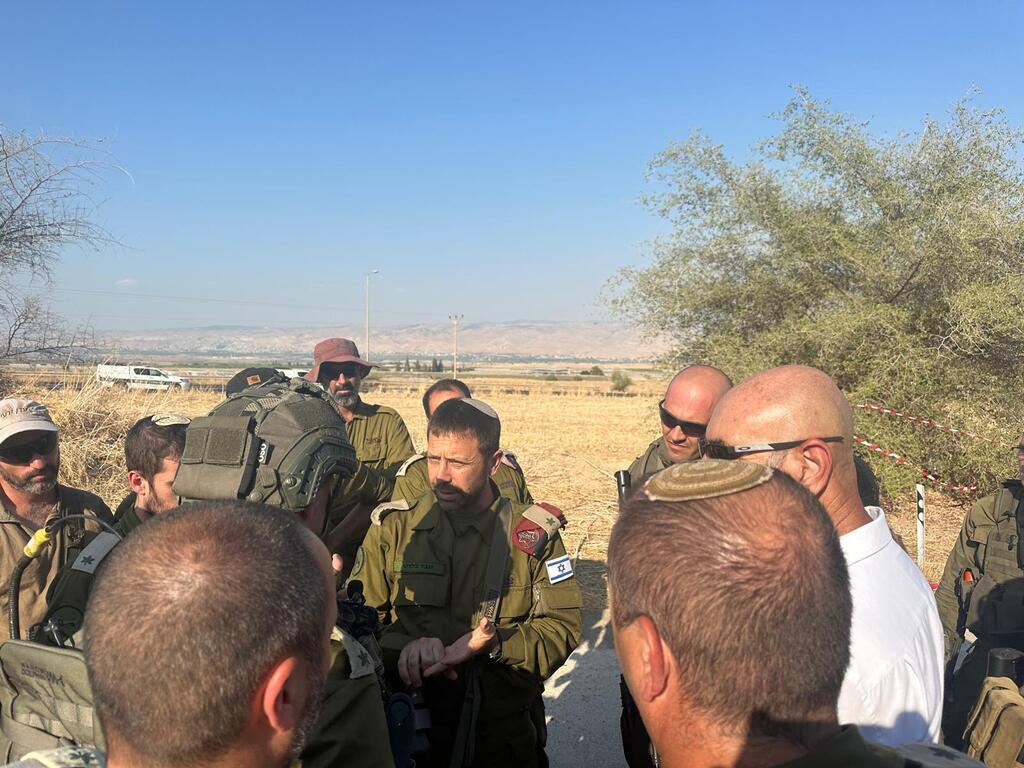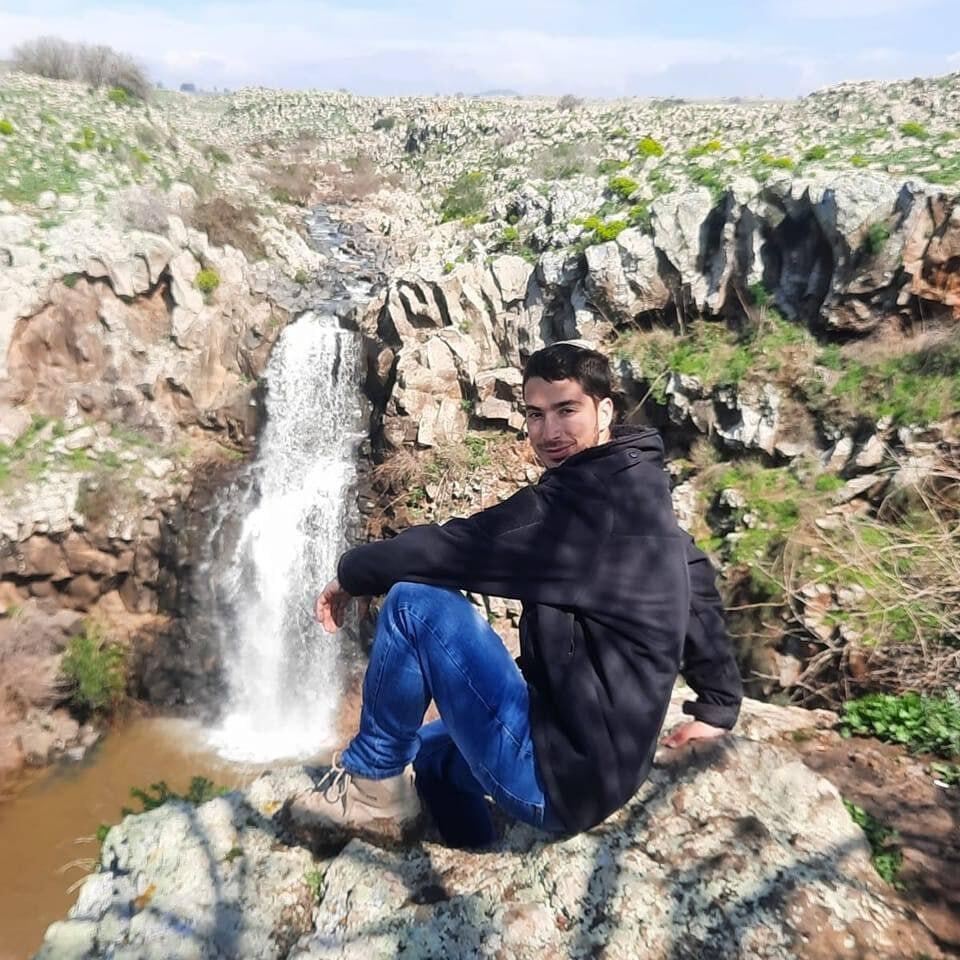Getting your Trinity Audio player ready...
Since October 7, Uri Deutsch has been extremely worried about his son Yonatan, who was a soldier in the Maglan unit and was at Kibbutz Nahal Oz on the day of the Hamas massacre. Yonatan fought bravely, first in the Gaza border region and then inside the Gaza Strip. He was recently discharged from the IDF with many hopes for the future and a planned wedding with his fiancée, Emuna. However, these dreams were cut short on Sunday on Route 90 near the Mehola junction in the Jordan Valley, where a terrorist sprayed bullets at the car Yonatan was driving and killed him.
"I'm still struggling to comprehend it," said his father, Uri, on Monday morning on the Kan public broadcaster. "We are experiencing a big nightmare. I was very worried about this moment. Yonatan fought at Nahal Oz and then in all the places in Gaza, and we were very afraid. I had a bad feeling, and then they came out, and he gave the impression that it was all over. He got engaged two months ago to Emuna, came out of Gaza from Rafah, and returned the next morning to fight there. When he was discharged, we set a date for the wedding and started dreaming the dreams of life."
"He was thinking of starting to study," the father added. "Yonatan wanted to work in education, to join a youth village, to guide. He was a people person, a giving person, a joyful person. He loved his country and his people in an extraordinary way. Among other things, he was involved in a project called 'Tikvateinu' ("Our hope"), a project that tries to connect all parts of Israeli society, religious and secular people. We all have a common basis of being Jews, Israelis. He dreamed of establishing a movement and influencing the entire Israeli society."
After Yonatan was discharged from the IDF, his father felt a sense of relief. He has two other sons serving as combat soldiers in the IDF – one in Duvdevan and one in the Paratroopers Reconnaissance Unit. On Sunday, Uri spoke with Yonatan for the last time. "He was at home and left in the afternoon for a job interview as a youth guide in the settlement of Ofra," he said. Yonatan left home around 3 p.m. and first planned to visit his fiancée and then go to the interview. On the way to her, he was murdered.
Uri said that when he heard about the attack at the Mehola junction, he immediately called Yonatan. "He didn't answer, so we called again, and he didn't answer again," he said. "I started the car and left Beit She'an, a 15-minute drive from home – and arrived at a blocked checkpoint. I parked the car on the side of the road and started running toward the checkpoint. I asked people to tell me if it was him or not, and they didn't know what to say. Slowly, I understood it was him."
When asked how he realized it was his son, Uri replied: "They asked me his name, I told them, and I told them the model and color of the car. I saw them stepping back; I moved forward and asked them, 'Please, tell me.' As I moved forward and they moved back, I had a bad feeling. My wife kept calling me, and I didn't answer because I didn't want to tell her over the phone. Then one of the officers or policemen told me he was in bad shape, and I understood. I went home and started informing everyone."
The father said that even though Yonatan came from a religious family, and it is less common to invite a girlfriend home before the wedding, "As soon as Emuna came in, my wife and I said it felt natural, and she became part of the family. She blended in. He was so happy with her, he cared so much for her and loved her. They started dreaming dreams, working in a youth village, and becoming a family for at-risk youth. These are the purest dreams – thinking about where we are needed and where it is right to be."
Uri Deutsch is the principal of ORT Psagot High School in Beit She'an, where he came from Modi'in nine years ago out of a sense of mission – which, according to him, all his children share. On Sunday, Beit She'an Mayor Noam Jumaa published numerous text messages that Yonatan sent him over the years, repeatedly asking to volunteer and assist in various projects – from requests to borrow a cart to help a married couple move, through requests to post acknowledgments for the national service girls and students who helped during the coronavirus, to assistance in a project helping the Bnei Menashe community.
"It's hard to summarize Yonatan," Jumaa wrote, "but I nonetheless delved into our WhatsApp messages for a moment. Out of hundreds of messages, I brought only a few that highlight a small point about a great man who was murdered and left us prematurely. The first message I received from him was on May 15, 2018, where he wrote that he was from Bnei Akiva and looking to volunteer in the city. Since then, he sent hundreds of messages, most dealing with the needs of the public.
"Yonatan was a serial volunteer," added the mayor. "In Bnei Akiva, he was part of a small group of volunteer headquarters during the first wave of coronavirus. Alongside volunteering, he always saw the people around him. Despite the age difference, I saw him as a friend, a young hero, freshly discharged from a special unit. He had a huge heart that made a significant mark in Beit She'an and beyond. There is so much to learn from him."
Since Sunday's attack, IDF has been conducting a wide manhunt for the terrorists, who have not yet been captured. Before fleeing, they also managed to shoot 32-year-old Anas Jaramana – who was lightly injured. On Sunday, IDF Chief of Staff Herzi Halevi said at the scene of the attack that the clock is ticking to catch the terrorists, emphasizin: "Our mission is to catch these terrorists and reach them before the attacks, and we failed here."




